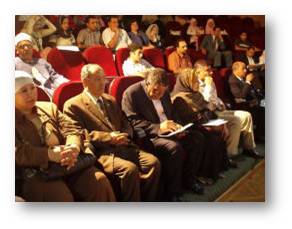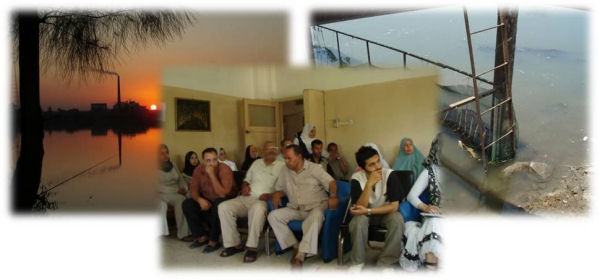|
In this issue:
The Cyprus INECO and Nostrum-DSS Joint Event:
IWRM through coordination, dissemination and
exploitation of research outcomes
Egypt: Meeting local residents in Basandeila
Syria: Discussing with authorities on the pollution of the
Barada River
Lebanon:
Unveiling conflicts & perceptions on water stress in the
Damour River Basin
Cyprus: Citizen proposals for the protection of the Pegeia Aquifer
The 2nd semester Deliverables of INECO
Future project events
The INECO Consortium |
|
The INECO Egypt Stakeholder Workshop
Meeting local residents in Basandeila
|
|
The 1st day of the Egypt Stakeholder workshop in
Mansoura
|
|
The INECO Local Stakeholder Workshop was held on July
21st 2007, at the Conference Hall of the Mansoura Children's’ Hospital of the
Mansoura University. It was the fourth in a series of stakeholder events
already organized in Egypt, with the aim to:
-
Promote information sharing,
-
Enhance awareness on water resource protection and conservation, and
-
Develop dialogue among all parties on water pollution issues in the Dakahlia Governorate.

More information
|
The workshop focused on water pollution experienced
in the Basandeila Nile Branch, and on drinking water quality issues in the
Basandeila village and neighbouring agglomerations. The Basandeila area,
similarly to the entire Nile water distribution network, faces alarming
water quality degradation problems. Waste disposal, heavy use of pesticides,
inadequate domestic wastewater treatment, and uncontrolled discharge of
industrial effluents have transformed open waterways to repositories and
conveyors of liquid waste, and have created major pollution issues. In the
region of the Bahr Basandeila Canal, water pollution is mostly due to the
discharge of industrial and municipal effluents without prior treatment. The
serious contamination of waters that are also used for potable water supply, raises
questions on the safety of water produced for drinking purposes, even after
it has been treated by the compact unit installed in the area. Furthermore,
there are increasing complaints on the quality (taste and odour) of tap
water, the condition of the water distribution network and the quality of
the water services provided (frequent supply interruptions).
|
Event overview |
|
The event was structured
in 2 main sessions. Session 1 was dedicated to overview
presentations, including:
|
During the 2nd session, Basandeila village residents presented their views, and
queried the representatives of the corresponding
authorities on the quality of waters of the Basandeila
Nile Branch, the applied water treatment processes, and
the quality of the water that actually reaches their
homes.
|
2nd Day: Local Stakeholder Meeting in the Hospital of Basandeila |
|
Following from the 1st day workshop, the INECO team
organized an additional stakeholder meeting in the Basandeila Hospital, on
Sunday, July 22nd 2007. Approximately 30 people participated in the
meeting, including leaders of the National Democratic Party, hospital
employees and officials of the Drinking Water Treatment Plant of Basandeila.
The meeting was also attended by Eng. Mohamed Ragab, responsible for Potable
Water and Sanitary Drainage in the Dakahlia Governorate and by Prof.
Dionysis Assimacopoulos, the INECO Project Coordinator.
During the meeting it became evident
that drinking water quality problems exist and can be
related to the condition of the water distribution network. |
Participants jointly decided that local initiatives
are essential for addressing the quality problem, and discussed the following
course of action:
-
The Water Utility would check connecting pipes along
the distribution network to ensure that there is no
leakage or mix of domestic sewage and potable water.
-
Residents and local actors should help in identifying
problematic areas and inform the Water Utility on the
future needs of the region in potable water, so that the
local capacity expansion plan is updated.
-
All local actors should try to enhance awareness among
local residents on ways to protect the waters of the
canal, and discourage the disposal of domestic waste,
sewage and dead livestock bodies in the Basandeila Canal
(water intake area).
More information |
|
 |
 |
|


